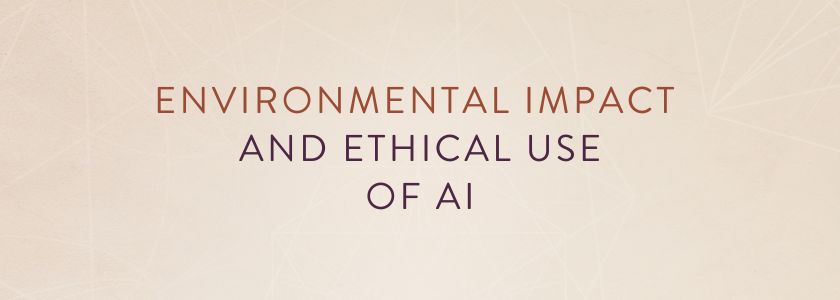
I work with visionaries and heart-led, values-driven entrepreneurs so it’s no surprise that these are the top questions I get asked about AI, and maybe you’ve had this on your mind and heart too:
Is using AI ethical? And what about the impact on the environment?
It’s a valid concern, and one I have thought a lot about too. Today I want to share my perspective with you, along with some real data that might surprise you!
I’ve had the privilege of meeting some brilliant minds working on AI, and the people I’ve talked to are deeply committed to making these systems energy-efficient, and as they do, they believe their AI systems can combat climate change too. 💖🌎
That being said, yes, AI requires energy. The large language models that power tools like ChatGPT and Claude run on data centers that need electricity for computing and water for cooling. Major tech companies are investing heavily in carbon-neutral data centers, with some already powered by 100% renewable energy.
But how much energy are we talking about?
According to the latest detailed calculations, a single ChatGPT query uses about 0.3 watt-hours of electricity, which is way less than initially thought. To put that in perspective:
• An average light bulb left on for an hour: 60 watt-hours
• Charging your smartphone fully: 15 to 20 watt-hours
• Boiling water for tea: 70 to 100 watt-hours
• Running a refrigerator: 24,000 to 48,000 watt-hours per year
Working with ChatGPT daily is going to use a lot less energy than many other regular things you do, probably without giving it much thought.
🌱 These are some of the ways AI is accelerating solutions to climate change too:
- AI is optimizing renewable energy systems, making solar and wind power more efficient and reliable
- It’s developing reforestation models, and climate modeling that can help us solve some of the crises we face
- Smart buildings powered by AI are reducing energy waste in real-time
- AI-driven materials science is developing new sustainable materials and technologies that will greatly contribute to the more regenerative world we want to see
According to recent research from Digital Europe, digital technologies have the potential to reduce global CO2 emissions by 20% by 2030.
A recent report from McKinsey reveals that AI-driven technologies can help businesses reduce their CO2 emissions by up to 10% and cut energy costs by 10-20%. It also has the potential to deliver energy savings of up to 20% in buildings, and 15% in transportation systems.
There is a lot to be hopeful about, while also advocating for AI regulation and being mindful of our own actions while engaging with AI.
Bigger companies need to play their part, but of course we all have a role to play.
So what can we personally do to work with AI in alignment with our values, and lessen our own AI carbon footprint?
👉 One of the biggest things is to be super efficient when we are prompting LLMs like ChatGPT and Claude so you get a great output on the first try without having to keep prompting and trying to get an output you like.
This is why I’m so passionate about teaching efficient AI use in my AI Dream Team program.
The future is not about choosing between technology and sustainability. We can have both, and we might be able to leverage one to enable the other.
What personal commitments will you make moving forward? Here are just a few of mine:
💫 I am powering my home with solar energy to significantly offset my carbon footprint
☀️ I’m mindfully booking travel, and checking the carbon footprint of the flight through CO2 filters that booking platforms like Kayak have ✈️
💫 Using tools like MyClimate to have a net-zero (or close to it) life and business
💫 I’m also committed to teaching others how to use AI efficiently and ethically through my work and in AI Dream Team
Part of ethical AI use is creating GPTs based on our own work rather than relying solely on general models—practices I teach in AI Dream Team.
By developing more specialized, efficient AI tools, we can reduce the computing resources needed while getting better results.
Join us here if you’re not already enrolled and start ethically and efficiently building an AI support team in your business!
Remember, we’re all figuring this out together as we navigate this unprecedented technological evolution.
What matters most is that we stay conscious, keep asking important questions, and make choices aligned with our values and vision for the future. ✨🔮
